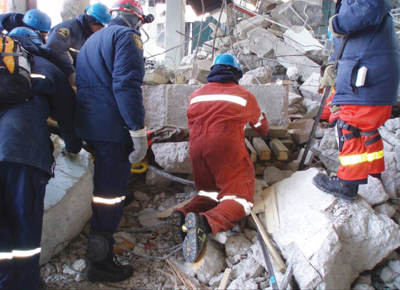World Radio Day on 13 February brings attention to the role of radio in managing disasters and recovery in their aftermath.
Radio is recognized as a low-cost medium, specifically suited to reach remote communities and is especially effective in reaching people affected by disasters when other means of communication are disrupted. Terrestrial radio broadcasts are effective in providing timely, relevant and practical information to people who are confused and demoralised by the impact of a crisis. Broadcast information is particularly useful in situations where physical access is difficult and aid responders may take several days or weeks to reach affected communities.

Recent natural and man-made disasters are a major cause for concern to the global community. “In times of crisis and emergency, radio can be a lifeline,†said United Nations Secretary-General Ban Ki-moon. “For people in shattered societies, or caught in catastrophe, or desperately seeking news, radio brings lifesaving information. This year, as we start carrying out the Sustainable Development Goals, let us resolve to use radio for human progress. On this World Radio Day, let us resolve to prove that radio saves lives.â€
“Radiocommunication is indispensable in saving lives in the event of a natural disaster,†said ITU Secretary-General Houlin Zhao. “Collaborating and sharing experiences is critical in order to support national and regional preparedness, and ITU is deeply committed to facilitating rapid and effective response in emergencies.â€
“Amidst the ruins and in the face of an emergency, the radio is often the first medium for survival,†says Irina Bokova, Director-General of UNESCO. “Its durability is an incomparable advantage, often enabling it to resist shocks and re-transmit messages of protection and prevention to as many people as possible, better and faster than other media, saving lives.â€
New developments in radio technology and in the transmission and delivery of radio content, especially through mobile devices and through on-demand media platforms, further extend the means to engage disaster-affected communities. These digital innovations are increasingly important in delivering effective disaster preparedness and prevention, while reinforcing the importance of community radio services.
ITU has developed a number of standards for effective emergency radiocommunications, recognizing that direct communication via radio helps reduce the sense of isolation and helplessness experienced by crisis-affected communities. Recommendation ITU-R BT.1774-2 is the standard that relates to emergency warning systems for analogue broadcasting, which facilitates the use of satellite and terrestrial broadcast infrastructures for public warning, disaster mitigation and relief.
In addition, the 2015 ITU World Radiocommunication Conference (WRC-15) identified spectrum to facilitate mobile broadband communications for robust and reliable mission-critical emergency services in public protection and disaster relief (PPDR), such as police, fire, ambulances and disaster response teams. WRC-15 also reinforced protection to search and rescue beacons to uplink to satellites, such as the Cospas-Sarsat system, which has assisted in rescuing over 37,000 people worldwide since December 2013.
World Radio Day marks the anniversary of the first broadcast by UN Radio in 1946, when it transmitted its first call sign: “This is the United Nations calling the peoples of the world.†Ever since, UN Radio broadcasts have highlighted the principles of the United Nations to foster world peace and development. World Radio Day seeks to raise awareness about the importance of radio, facilitate access to information through radio, and enhance networking among broadcasters.
- See more at: http://www.tetra-applications.com/32088/news/world-radio-day-focuses-on-role-of-radio-in-disaster-management#sthash.WRnylSLy.dpuf
No comments:
Post a Comment